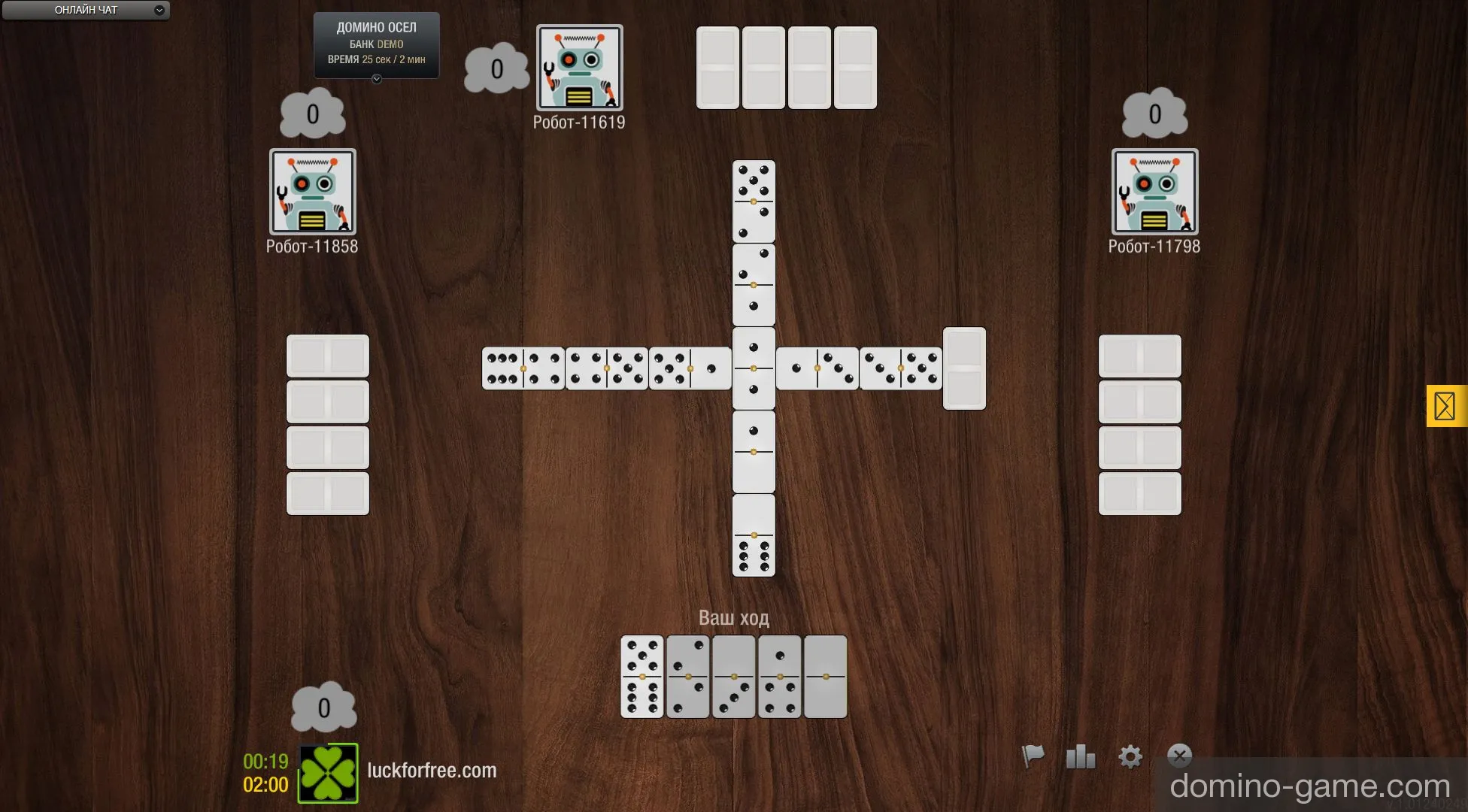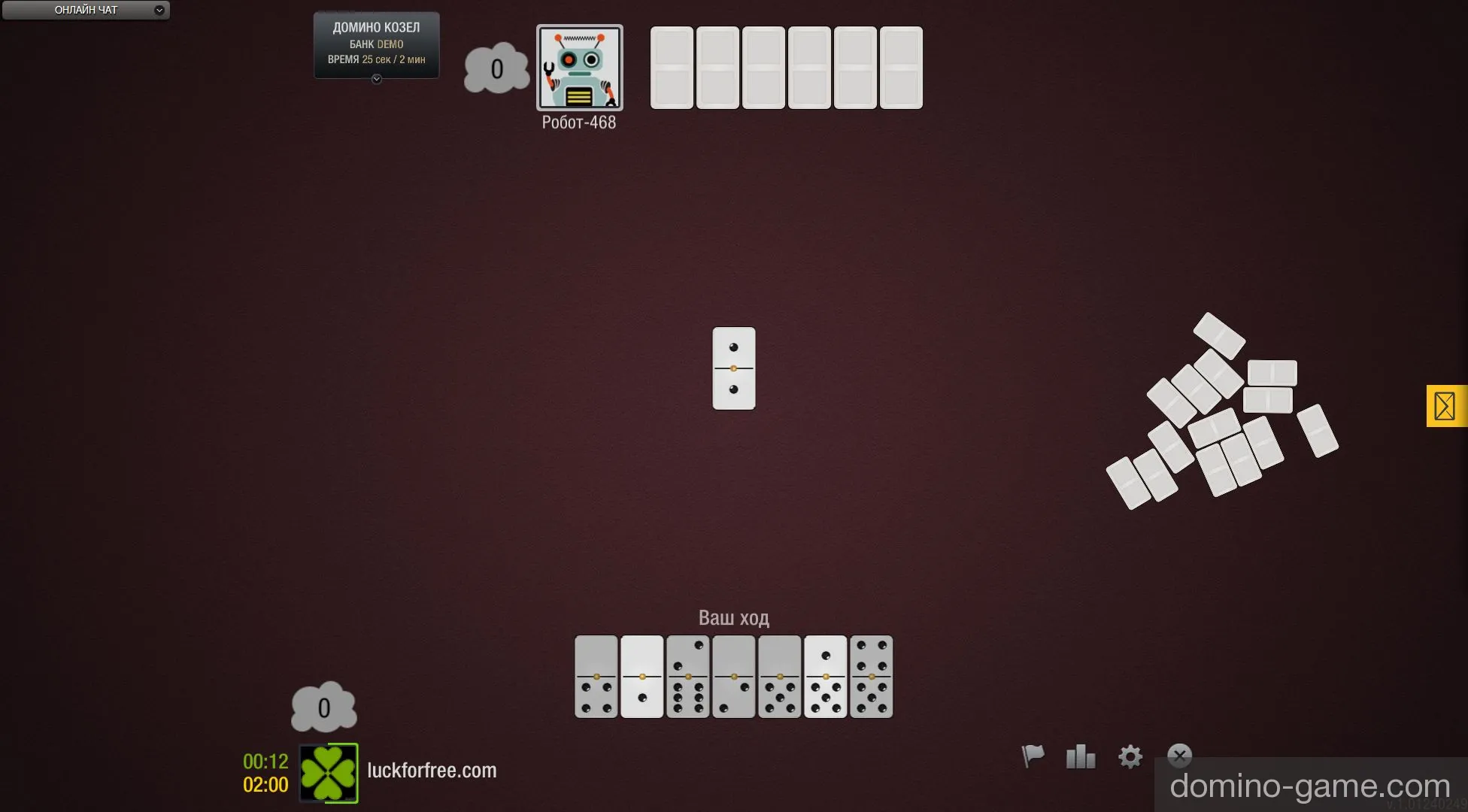- Domino online
- /
- Rules
Rules of dominoes
Playing dominoes requires twenty-eight rectangular tiles, each divided by a line into two halves. Each half contains a certain number of dots from one to six or is left blank. Tiles for playing dominoes are also called bones, dominoes, stones, or cards.
The rules of dominoes are simple and understandable even to beginners. The number of players can range from two to four. Participants receive seven tiles each, with the remaining tiles in reserve, called the Bazaar.
The right to make the first move belongs to the holder of the double 1-1. If no player has this tile during the deal, then the player with the double 2-2 makes the first move, and so on, in ascending order. Starting the game from an empty tile is prohibited. Sometimes it happens that there are no doubles in the hands of the partners at the beginning of the game; in this case, the duel begins with the player who has the tile with the lowest number of dots, for example, 1-0. Subsequently, participants take turns clockwise.

According to the rules of dominoes, partners add their tiles to the first tile in such a way that the number of dots on the two halves of different tiles is equal. If a player has no moves, they draw one tile from the Bazaar. A player will continue drawing tiles until they get a tile they can play or until the Bazaar is empty.
In the game, you can change the number of tiles that remain untouched in the Bazaar. To do this when creating the game, it is sufficient to select the desired Bazaar parameter: All, Without one, Without two.
The player who first gets rid of their tiles on the game board is declared the winner. No points are scored for them. The remaining players in the game are credited with the sum of the points of the tiles remaining in their hands.
Objective of the Game
The main goal of the participant is to get rid of tiles first in each round.
Fish in Dominoes
In all variations of dominoes, there is a concept called Fish. This is a situation where none of the partners has the opportunity to continue the game. For example, if tiles with the number three are on both ends of the chain, and all tiles with this number of dots have already been used. Fish means that the game is coming to an end, and participants need to count the points scored. In such a situation, victory goes to the player with the fewer points on their tiles.
Fish can be declared if the double was not played and remained in hand or in the Bazaar. To do this, you need to select the Fish convention With double, Without double.
When applying for a game, you can change the method of scoring points in the event of a Fish.
If the "Own on the loser" option is selected in the game settings, the player or team with the highest number of points in the event of a Fish records their own sum of points on the remaining tiles.
If the "Own" option is selected in the game settings, each participant records the sum of points on their remaining tiles.
If the "All on the loser" option is selected in the game settings, the sum of points of all players is recorded for the player who scored the most points.
Scoring Points
For losing players, all points on hand are recorded. Tiles give as many points as the number of dots depicted on them, except for double 0, for which ten points are given. Domino rules stipulate that the game ends when one player's total score exceeds one hundred.
Rules for Different Types of Dominoes
There are many variations of this game, but among enthusiasts, Goat and Donkey are the most popular. They differ from each other only in some nuances.
Let's consider the most well-known types:
- Goat. In this game, 2 to 4 players participate, each receiving 7 tiles. The battle begins with the holder of the smallest double. If a player needs to, they go to the Bazaar, from where they take one tile at a time until the needed one appears. After the round ends, opponents tally up the points. Points are recorded if a player scores at least thirteen points. The points from each round where a player scored less than 13 points are summed up and remembered. They are recorded when a player scores 13 or more points in a deal. If a player wins the next round, all their remembered points are reset. The second round is started by the player who won the previous game. The participant whose sum of points first exceeds the threshold of 100 points loses.
- Team Goat. This is played by two teams of four, two on two. Points in the game are not recorded for each player but are summed up for the team. The points of the losing team are summed up, and nothing is recorded for the winning team, even if one player has remaining tiles. The game is traditionally played to 101 points. The Fish rules are the same as in the individual game.
- Donkey. Its peculiarity lies in the fact that after the first move, the other players have the right to attach tiles to all four sides of the double, thus forming a cross on the game board. The participant who played the double has the right to close it by simply turning it over. After that, tiles cannot be placed on the same side. The scoring in this variation is done the same way as in Goat.
- Team Donkey. This is played by four players in pairs. Players try to support their partner, attempting to guess their tiles. After the round, points are recorded only for the losing team, and in the event of a Fish, the scoring of points depends on prior agreement.

Despite the fact that luck plays a significant role in the game, there are some tricks that can increase a player's chances. A properly chosen strategy will undoubtedly bring a positive result. Therefore, studying possible game strategies and applying them in practice will have a positive impact on the player's skill.